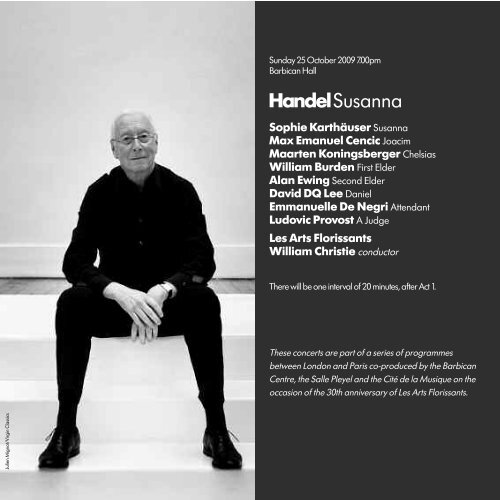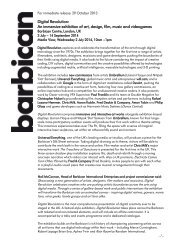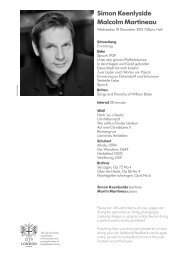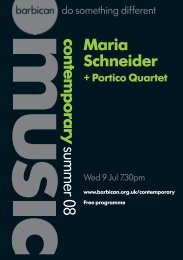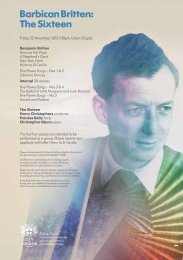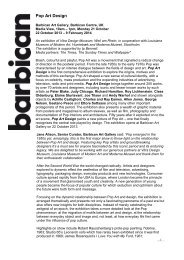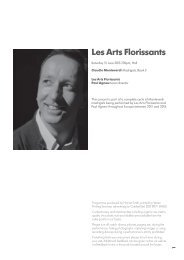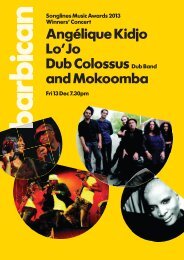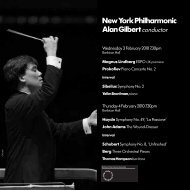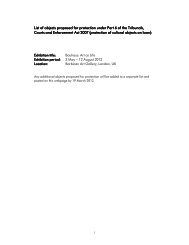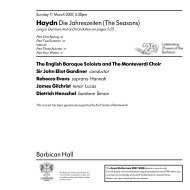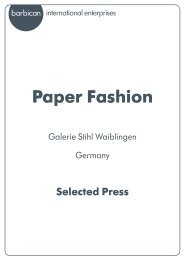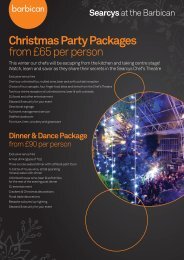Handel Susanna - Barbican
Handel Susanna - Barbican
Handel Susanna - Barbican
You also want an ePaper? Increase the reach of your titles
YUMPU automatically turns print PDFs into web optimized ePapers that Google loves.
Julien Mignot/Virgin Classics<br />
Sunday 25 October 2009 7.00pm<br />
<strong>Barbican</strong> Hall<br />
<strong>Handel</strong> <strong>Susanna</strong><br />
Sophie Karthäuser <strong>Susanna</strong><br />
Max Emanuel Cencic Joacim<br />
Maarten Koningsberger Chelsias<br />
William Burden First Elder<br />
Alan Ewing Second Elder<br />
David DQ Lee Daniel<br />
Emmanuelle De Negri Attendant<br />
Ludovic Provost A Judge<br />
Les Arts Florissants<br />
William Christie conductor<br />
There will be one interval of 20 minutes, after Act 1.<br />
These concerts are part of a series of programmes<br />
between London and Paris co-produced by the <strong>Barbican</strong><br />
Centre, the Salle Pleyel and the Cité de la Musique on the<br />
occasion of the 30th anniversary of Les Arts Florissants.
introduction<br />
Les Arts Florissants at 30<br />
What a difference a generation makes. In the past 30 years, the world of Baroque music-making has been transformed.<br />
Musicians had for a while been acquiring the skills of playing old instruments and rediscovering former playing styles, but it<br />
was only during the 1970s that these made a major impact on the wider public. Of course there had been pioneers before<br />
this: a whole generation of enthusiasts and researchers had explored old repertory, and Arnold Dolmetsch had played his<br />
clavichord in candlelit London drawing rooms to the delight of George Bernard Shaw and Percy Grainger. But this was<br />
essentially an esoteric activity – until a new generation of players and conductors launched themselves into the re-creation of<br />
Baroque ensembles in the 1970s.<br />
William Christie’s achievement with his French group Les Arts Florissants from 1979 onwards has been an outstanding part of<br />
this revival, for it grew out of a repertory that many had thought inaccessible – the distant world of the French Baroque, with<br />
its rich and dense texts, its complex ornamentation and rhetoric, and its unfamiliar emotional language. What Christie and<br />
his young ensemble achieved in spectacular fashion was to show how, when performed with penetrating understanding and<br />
vivid communication, this music could be made as available and exciting as any on offer. From Charpentier (who gave the<br />
ensemble its name) and Lully through to Rameau, Les Arts Florissants lit up this music and brought it to life with unparalleled<br />
success.<br />
Christie’s ensemble has moved from the French Baroque into <strong>Handel</strong> and Purcell, Monteverdi and Landi, and beyond that to<br />
Haydn and Mozart. It has gained a huge following for its fresh insights into Haydn’s The Creation and Monteverdi’s Vespers,<br />
and its staged operas here at the <strong>Barbican</strong> – the fantastical, video-dominated production of Rameau’s Les Paladins and Luc<br />
Bondy’s severely intense staging of <strong>Handel</strong>’s Hercules – have been among the highlights of our output.<br />
So it is appropriate that this anniversary season celebrates the historic achievement of Les Arts Florissants with opera<br />
(Purcell’s immortal Dido and Aeneas), oratorio (<strong>Handel</strong>’s rarely performed <strong>Susanna</strong>) and the French choral motets that the<br />
group has made its own. And it is also entirely typical of its work with younger artists that for two of these anniversary<br />
concerts, William Christie hands the baton on to directors of the next generation, Jonathan Cohen and Paul Agnew. Like the<br />
great music of the past, Les Arts Florissants will continue to reinvent itself as it looks towards the next 30 years.<br />
Nicholas Kenyon<br />
Managing Director<br />
2
programme note<br />
George Frideric <strong>Handel</strong> (1685–1759)<br />
<strong>Susanna</strong>, HWV 66 (1748)<br />
An oratorio in three acts<br />
Libretto after the Apocrypha<br />
<strong>Handel</strong> had ridden the crest of a nationalist wave with his<br />
‘victory’ oratorios of 1746–7, The Occasional Oratorio, Judas<br />
Maccabaeus (prompted by ‘Butcher’ Cumberland’s brutal<br />
quelling of the Jacobite forces at Culloden), Alexander Balus<br />
and Joshua. Having given the English something ‘to hit them<br />
on the drum of the ear’, as he wryly put it, <strong>Handel</strong> turned<br />
decisively from this bellicose vein in his next pair of oratorios,<br />
Solomon and <strong>Susanna</strong>, composed in the spring and summer<br />
of 1748 in readiness for the 1749 Lenten season. Both works<br />
seem to share the same, anonymous, librettist, and celebrate<br />
justice, marriage and the delights of the countryside. Yet<br />
in other respects they could hardly be more different.<br />
Solomon, with its hieratic double choruses and sumptuous<br />
orchestration, glorifies kingship and an idealised golden<br />
age. <strong>Susanna</strong>, scored for a chamber orchestra of oboes,<br />
bassoons and strings (plus trumpets in the celebratory music<br />
at the end of Act 3) is an intimate drama on the favourite<br />
18th-century ‘sentimental’ theme of wronged innocence, with<br />
occasional shades of the newly fashionable ballad opera.<br />
After <strong>Susanna</strong>’s premiere at Covent Garden on 10 February<br />
1749, the Countess of Shaftesbury – one of <strong>Handel</strong>’s most<br />
faithful supporters – wrote to another passionate <strong>Handel</strong>ian<br />
James Harris: ‘I … believe it will insinuate itself so much into<br />
my approbation as most of <strong>Handel</strong>’s performances do, as it<br />
is in the light operatic style’, adding, ‘I think I never saw a<br />
fuller house.’ After three performances the composer<br />
deposited the handsome sum of £550 (roughly equivalent to<br />
£70,000 today) in his bank account. But <strong>Handel</strong>’s wider<br />
middle-class public did not apparently share the Countess’s<br />
enthusiasm. <strong>Susanna</strong> was taken off after one further<br />
performance, and only revived, in a mangled and truncated<br />
version, during the last weeks of <strong>Handel</strong>’s life. Even in an age<br />
4<br />
when the composer has never had it so good, it remains one<br />
of the least known of his oratorios.<br />
Perhaps the ‘light operatic style’ cultivated in parts of this<br />
Biblical detective story drawn from the Apocrypha has fazed<br />
audiences expecting epic <strong>Handel</strong>ian fare. Though set<br />
against the background of Jewish exile in Babylon, <strong>Susanna</strong><br />
is in essence a drama of English village life, with, as Winton<br />
Dean puts it in his classic study of <strong>Handel</strong>’s oratorios,<br />
something of ‘the charm of a Chaucer tale’. But Dean surely<br />
goes too far in calling <strong>Susanna</strong> ‘a comic opera’ and the<br />
lascivious, ultimately evil Elders merely ‘caricatures of the<br />
naughty old men to be found in any English village’. True,<br />
there is a touch of humour in <strong>Handel</strong>’s treatment of the<br />
Elders. But the oratorio’s central themes – of spotless<br />
innocence versus senile lechery, attempted rape, perjury and<br />
<strong>Susanna</strong>’s narrowly averted judicial murder – are anything<br />
but comic.<br />
The angular, edgy fugue of the overture, fruitfully recycling<br />
motifs from John Blow’s 1684 St Cecilia Ode, immediately<br />
establishes a serious tone. Its mood is then intensified in the<br />
sombrely magnificent choral chaconne ‘How long, oh Lord’<br />
on a four-bar descending ground bass – traditional<br />
Baroque symbol of mourning (compare, say, Dido’s Lament).<br />
While some commentators, Dean included, have found this<br />
Aeschylean opening chorus incongruous in the light of the<br />
marital idyll that follows, <strong>Handel</strong> surely intended it as a<br />
harbinger of the grave issues at stake in the work. He<br />
balances it with the equally momentous chorus, in three<br />
sections, at the end of Act 1. While the antics of the infatuated<br />
Elders are ridiculous, the potentially appalling consequences<br />
of their actions unleash a minatory thunderbolt, culminating<br />
in a tremendous double fugue that sets a falling chromatic
line against a lashing countersubject inspired by the words<br />
‘Wrath divine outstrips the wind’.<br />
Described in the Apocrypha as ‘a very fair woman, and one<br />
that feared the Lord,’ <strong>Susanna</strong> – a role written for Giulia<br />
Frasi, favoured prima donna of <strong>Handel</strong>’s later years – is one<br />
of the composer’s most sensitive and touching creations,<br />
whose developing portrait is the prime agent of unity in an<br />
oratorio of wide-ranging musical styles. Her sweetness,<br />
piety and unclouded happiness are beautifully evoked in her<br />
first two arias – the dulcet ‘Would custom bid the melting<br />
fair’, with its tender violin echoes and blissful lingering on<br />
the word ‘mine’, and the tripping, galant ‘Without the<br />
swain’s assiduous care’ – and in her blithe duet with her<br />
husband Joacim. Yet even before the entry of the Elders,<br />
her husband’s imminent absence prompts a strange sense<br />
of foreboding. Her accompanied recitative and noble<br />
B minor aria ‘Bending to the throne of glory’, movingly<br />
suggest a strength and steadfastness that make her first<br />
cousin to the Christian martyr Theodora, heroine of<br />
<strong>Handel</strong>’s next oratorio.<br />
<strong>Susanna</strong>’s characterisation deepens further in Acts 2 and 3.<br />
In ‘Crystal streams’, the sounds and scents of a sultry<br />
summer’s afternoon, and her longing for Joacim<br />
(bowdlerised, like so much else in the oratorio, in the Novello<br />
vocal score), provoke a ravishing aria of drowsy sensuality.<br />
After her rejection of the Elders, she attains tragic stature in<br />
‘If guiltless blood’, music of mingled stoicism and, in the rapt<br />
major-key central section (briefly interrupted by the Second<br />
Elder’s demand for her death), spiritual radiance. <strong>Susanna</strong>’s<br />
kinship with Theodora is again underlined in her sublime<br />
Act 3 air ‘Faith displays her rosy wing’, whose key, F minor,<br />
programme note<br />
and abrupt dynamic contrasts suggest an inner anguish at<br />
odds with the serene faith of the words. Finally, <strong>Handel</strong> gives<br />
her a bravura aria, ‘Guilt trembling’, celebrating the triumph<br />
of virtue and her heroism in the face of death – and allowing<br />
La Frasi to impress the Covent Garden public with her agile<br />
coloratura technique.<br />
<strong>Handel</strong>’s portrayal of the two Elders, Judges of the exiled<br />
Jewish community ‘waxen old in wickedness’, is equally vivid.<br />
The self-dramatising First Elder announces himself in an<br />
over-the-top accompanied recitative, like a parody of an<br />
opera seria scena, and then launches into a wheedlingly<br />
sentimental minuet-ballad ‘Ye verdant hills’. His second aria,<br />
‘When the trumpet’, is in mock-martial vein, with priapic<br />
flourishes from the violins. He is initially more consciencestricken<br />
than his companion-in-lechery; yet his hypocritical<br />
grief at <strong>Susanna</strong>’s imminent death, ‘Round thy urn’, is the<br />
most morally repulsive moment in the oratorio. The Second<br />
Elder is all incontinent bluster, his two arias characterised by<br />
gruff unisons, splenetic coloratura and absurd vocal leaps.<br />
Like his closest <strong>Handel</strong>ian predecessor, the cyclops<br />
Polyphemus in Acis and Galatea, he is at once comicgrotesque<br />
and formidable. The Elders’ contrasted<br />
characters are brilliantly delineated in the dramatic trio that<br />
forms the climax of Act 2, ‘Away, ye tempt me both in vain’.<br />
As <strong>Susanna</strong> hurls defiance, the First Elder entreats in<br />
simpering chromaticisms, while the Second threatens<br />
violence in peremptory scales doubled by cellos and basses.<br />
If the other characters are more generic, each has<br />
memorable music. Of Joacim’s three arias in Act 1, ‘When<br />
first I saw my lovely maid’ is a lilting, quintessentially English<br />
pastoral, while ‘The parent bird’ features gently twittering<br />
5
programme note<br />
violins in a soulful F sharp minor. <strong>Susanna</strong>’s father Chelsias<br />
does little but mouth moralising platitudes. But his arias are<br />
vital: ‘Who fears the Lord’, earnestly contrapuntal, while in his<br />
final aria, ‘Raise your voice’, taken up by the chorus, a solo<br />
trumpet vies in jubilation with the voice.<br />
Early in Act 2 <strong>Susanna</strong>’s (unnamed) Attendant seeks to<br />
assuage her mistress’s longing for the absent Joacim with<br />
the song he composed when he was wooing her: ‘Ask if yon<br />
damask rose’ is a delectable rustic bourrée with, again, a<br />
pronounced English flavour. (This prime example of ‘the<br />
light operatic style’ was pilfered by Thomas Arne in his<br />
ballad opera Love in a Village.) The Attendant’s second<br />
song, ‘Beneath the cypress’, recalling her own lover’s<br />
death and presaging the near-tragedy of the following<br />
scenes, is a sorrowful D minor siciliano (a vein in which<br />
<strong>Handel</strong> never failed) with an undertow of eroticism. The<br />
youth Daniel, a Biblical deus ex machina, has his moment<br />
of glory in the aria ‘Chastity, thou cherub bright’, whose<br />
spiritual serenity and rich, often contrapuntal, string textures<br />
make it a counterpart to Irene’s ‘sunrise’ aria ‘As with rosy<br />
steps the morn’ in Theodora.<br />
6<br />
In <strong>Susanna</strong> <strong>Handel</strong> seems to have been less concerned than<br />
in most of his oratorios to give the chorus a consistent role. In<br />
the opening ‘How long, oh Lord’ they give grieving voice to<br />
the community of deracinated Jews. Elsewhere – say, in the<br />
finales to the first two acts, and the powerful choral prelude<br />
and fugue in the courtroom scene, ‘Righteous heav’n’ –<br />
they stand outside the action, commenting on its moral<br />
implications like the chorus in a Greek tragedy. The finale of<br />
Act 3, ‘Bless’d be the day’ – a paean to <strong>Susanna</strong>’s virtue – is<br />
a jaunty bourrée, far closer in style to <strong>Handel</strong>’s opera finales<br />
than to his other oratorios, and doubtless another reason for<br />
Lady Shaftesbury’s verdict. Only once, at the opening of Act<br />
3, does the chorus participate directly in the action. ‘The<br />
cause is decided’ is a marvellously graphic depiction of the<br />
excited crowd in the courtroom, chattering chaotically<br />
among themselves before uniting for cries of ‘<strong>Susanna</strong> is<br />
guilty, <strong>Susanna</strong> must bleed.’<br />
Programme note © Richard Wigmore<br />
Surtitles by Kenneth Chalmers
Synopsis<br />
The action is set in Babylon during the Jewish exile.<br />
Act 1<br />
After a choral lament, the fair <strong>Susanna</strong> and her husband<br />
Joacim, described in the Apocrypha as ‘a great rich man’,<br />
sing of their marital happiness. <strong>Susanna</strong>’s father Chelsias,<br />
who has raised his daughter ‘to fear the Lord’, voices the<br />
hope that <strong>Susanna</strong>’s devotion and piety may inspire ‘each<br />
wedded wife’. Joacim announces that he must make a<br />
business trip. After a change of scene, two Elders (‘the<br />
boasted Guardians of our Laws’) appear, both consumed<br />
with lust for <strong>Susanna</strong>. The First Elder has more trouble with his<br />
conscience than the Second. Together they plan to conceal<br />
themselves, then ‘rush upon the fair, Force her to bliss, and<br />
cure our wild despair’. The chorus (‘Righteous heav’n’)<br />
threatens divine retribution.<br />
Act 2<br />
Following a brief scene for the absent Joacim, <strong>Susanna</strong>, her<br />
spirits fainting ‘beneath the burning heat’, is filled with<br />
longing for her absent husband. She bids her Attendant sing<br />
synopsis<br />
to her. As <strong>Susanna</strong> bathes in her garden stream, the Elders<br />
seize their moment. After she repulses their advances (in the<br />
trio ‘Away, ye tempt me both in vain’), they announce that they<br />
have caught her in flagrante with ‘the youthful partner of her<br />
stol’n embrace’. She is taken off for trial. Joacim, informed of<br />
the charge by letter, hurries home.<br />
Act 3<br />
In the courtroom <strong>Susanna</strong> has already been condemned to<br />
death after a show-trial. The oleaginous First Elder weeps<br />
crocodile tears. <strong>Susanna</strong> is saved from the scaffold by the<br />
youth Daniel, who emerges from the crowd and, like an<br />
adolescent Solomon, exposes the Elders’ lies by asking each<br />
separately under which tree the alleged act of adultery took<br />
place. They give contradictory answers, and are in turn<br />
sentenced to death. Joacim returns to ‘the joyful news of<br />
chaste <strong>Susanna</strong>’s truth’. After a love duet the chorus sings<br />
in praise of <strong>Susanna</strong>, ‘the chastest beauty that e’er grac’d<br />
the earth’.<br />
Synopsis © Richard Wigmore<br />
7
Pascal Gély About<br />
about the performers<br />
tonight’s performers<br />
William Christie conductor<br />
William Christie’s pioneering work as<br />
harpsichordist, conductor, musicologist<br />
and teacher has led to a renewed<br />
interest in Baroque music in France.<br />
Born in America, he studied at<br />
Harvard and Yale Universities before<br />
moving to France in 1971, where he<br />
founded Les Arts Florissants eight<br />
years later. With the ensemble he has<br />
explored many neglected or forgotten<br />
works, both sacred and secular. As well<br />
as championing the French Baroque,<br />
ranging from Charpentier to Rameau,<br />
via Couperin, Mondonville, Campra<br />
and Montéclair, he is acclaimed in<br />
Monteverdi, Purcell, <strong>Handel</strong>, Mozart<br />
and Haydn.<br />
In the opera house, he has worked with<br />
many renowned directors, including<br />
Jean-Marie Villégier, Robert Carsen,<br />
Alfredo Arias, Jorge Lavelli, Graham<br />
8<br />
Vick, Adrian Noble, Andrei Serban<br />
and Luc Bondy. Last year Les Arts<br />
Florissants began a collaboration with<br />
the Teatro Real de Madrid, where the<br />
ensemble will perform all the<br />
Monteverdi operas over coming<br />
seasons.<br />
As a guest conductor William Christie<br />
regularly appears at Glyndebourne<br />
and with the Berlin Philharmonic<br />
Orchestra, as well as conducting<br />
Zurich Opera in works by Gluck,<br />
Rameau and <strong>Handel</strong>, and the Opéra<br />
National de Lyon in Così fan tutte and<br />
The Marriage of Figaro.<br />
He is also committed to the<br />
professional development of young<br />
artists, and many of the music directors<br />
of today’s Baroque ensembles began<br />
their careers with Les Arts Florissants.<br />
In 2002 he created Le Jardin des Voix,<br />
an academy for young singers in<br />
Caen, whose first three seasons<br />
generated considerable international<br />
interest.<br />
As a conductor and harpsichordist,<br />
William Christie has made over 70<br />
recordings, many of which have<br />
received awards.<br />
William Christie acquired French<br />
nationality in 1995. He is an Officier<br />
Sylvain Godfroid<br />
dans l’Ordre de la Légion d’Honneur<br />
as well as Officier dans l’Ordre des<br />
Arts et des Lettres. He was elected to<br />
the Académie des Beaux-Arts in<br />
November 2008.<br />
Sophie Karthäuser soprano<br />
Soprano Sophie Karthäuser studied at<br />
the Guildhall School of Music &<br />
Drama with Noelle Barker. She has<br />
since been engaged by many leading<br />
ensembles, including the Academy of<br />
Ancient Music, Les Arts Florissants, La<br />
Petite Bande, Les Folies Françoises,<br />
Akademie für Alte Musik, Freiburg<br />
Baroque Orchestra and the Leipzig<br />
Gewandhaus Orchestra.<br />
She has sung with conductors such as<br />
Riccardo Chailly, William Christie,<br />
Thomas Hengelbrock, René Jacobs,
Sigiswald Kuijken, Louis Langrée,<br />
Kazushi Ono, Jérémie Rhorer,<br />
Marcello Viotti and Christian<br />
Zacharias. She will give concerts with<br />
Cercle de l’Harmonie, the Leipzig<br />
Gewandhaus Orchestra and the<br />
Monteverdi Choir.<br />
In 2003, she won the audience prize in<br />
the Wigmore Hall’s Song Competition.<br />
She has appeared in recital at the<br />
Palais des Beaux-Arts (Brussels), La<br />
Monnaie, Flanders Opera, Opéra de<br />
Lille, Opéra de Nantes and at the<br />
Cologne Philharmonie. Forthcoming<br />
engagements include Wolf with<br />
Stephan Loges at Opéra National du<br />
Rhin and solo recitals in Waidhofen, at<br />
the Frankfurt Opera House and the<br />
Beaune Festival (France).<br />
Sophie Karthäuser sang her first<br />
Pamina (The Magic Flute) under<br />
Jacobs and <strong>Susanna</strong> (The Marriage of<br />
Figaro) under Christie. Further Mozart<br />
projects include Ilia at the Aix-en-<br />
Provence Festival, in Salzburg and<br />
Bremen as well as Sandrina (La finta<br />
giardiniera) in Vienna with Jacobs.<br />
Other opera projects include the<br />
title-role in Cavalli’s La Calisto under<br />
Christophe Rousset and a Rameau<br />
series with Christie in Aix-en-Provence.<br />
Further concerts will take her to venues<br />
such as the Musikverein, Carnegie<br />
Hall, Théâtre des Champ-Élysées and<br />
the Palais des Beaux-Arts.<br />
Her discography includes a solo<br />
album of Grétry arias, the complete<br />
Mozart songs, Haydn’s Die Schöpfung<br />
and Il Ritorno di Tobia and <strong>Handel</strong>’s<br />
Faramondo.<br />
Max Emanuel Cencic countertenor<br />
Max Emanuel Cencic is one of the<br />
leading countertenors of his<br />
generation. Initially a member of the<br />
Vienna Boys’ Choir, his career as a<br />
countertenor began in 2001. This year<br />
he makes his debut at La Monnaie,<br />
Brussels (Cavalli’s La Calisto), at the<br />
Bavarian State Opera (the title-role in<br />
Tamerlano) and at the Semperoper,<br />
about the performers<br />
Dresden (Giulio Cesare). He has<br />
also sung Ottone under Rinaldo<br />
Alessandrini in Bordeaux and given<br />
solo recitals in Vienna, Geneva, Tokyo,<br />
Hamburg and Avignon. Next spring he<br />
makes his debut with the Vienna State<br />
Opera and at the Teatro Real, Madrid.<br />
Max Emanuel Cencic regularly works<br />
with notable conductors such as<br />
William Christie, René Clemencic,<br />
Alan Curtis, Diego Fasolis, Michael<br />
Hofstetter, Eduardo López Banzo,<br />
Andrea Marcon, Günter Neuhold,<br />
Christophe Rousset and Jean-<br />
Christophe Spinosi.<br />
He is particularly in demand in the<br />
operas of <strong>Handel</strong> and Vivaldi, and has<br />
performed at the Teatro Carlo Felice in<br />
Genoa, for Scottish National Opera,<br />
at the Bayreuth Baroque Festival, at the<br />
Théâtre des Champs-Élysées, Teatro<br />
Nacional de São Carlos in Lisbon, and<br />
in Bremen, Torino and St Gallen,<br />
among others.<br />
In concert, Max Emanuel Cencic has<br />
appeared at leading concert halls,<br />
including those in Lisbon, Cologne,<br />
Essen, Vienna, Potsdam, Wiesbaden,<br />
Cremona, London, Amsterdam, Milan,<br />
Avignon and Tokyo and in such<br />
festivals as the Haydn Festival in<br />
Eisenstadt, the Halle <strong>Handel</strong> Festival<br />
9
Anne Dokter<br />
about the performers<br />
and at those in St Riquier, Uzès,<br />
St Denis, Beaune and Froville.<br />
His award-winning discography<br />
includes <strong>Handel</strong>’s Faramondo,<br />
Vivaldi’s Andromeda Liberata, a solo<br />
disc of Rossini arias, cantatas by<br />
Caldara and Scarlatti, The Vivaldi<br />
Album and Cantata d’amore, plus a<br />
DVD of Landi’s Il Sant’Alessio.<br />
Maarten Koningsberger baritone<br />
Maarten Koningsberger is one of the<br />
leading baritones in his native Holland,<br />
and has worked with renowned<br />
modern- and period-instrument<br />
ensembles throughout the Netherlands<br />
as well as with Les Arts Florissants,<br />
I Fiamminghi, Tafelmusik, Singapore<br />
Symphony Orchestra and the<br />
Orchestra of the Age of Enlightenment.<br />
10<br />
Among the conductors with whom he<br />
has worked are William Christie, René<br />
Jacobs, Ton Koopman, Reinbert de<br />
Leeuw, Arnold Östman, Gennady<br />
Rozhdestvensky, Ed Spanjaard, Jeffrey<br />
Tate, Lucas Vis, Hans Vonk and Jan<br />
Willem de Vriend.<br />
He has appeared internationally in<br />
operas by Debussy, Maderna, Menotti,<br />
Monteverdi, Mozart, Offenbach,<br />
Poulenc, Rameau, Richard Strauss and<br />
others. He is also in demand as a<br />
Lieder singer, and has appeared at<br />
such prestigious venues as the<br />
Amsterdam Concertgebouw and the<br />
Wigmore Hall, and has also given<br />
recitals in the Middle East, South<br />
America and South Africa.<br />
Recent and future engagements<br />
include Gounod’s Roméo et Juliette for<br />
Netherlands Opera, Stravinsky’s<br />
Pulcinella with the Rotterdam<br />
Philharmonic Orchestra, Purcell’s King<br />
Arthur at the Holland Festival, concerts<br />
with the Residentie Orchestra, a tour<br />
with the Academy of Ancient Music,<br />
and recitals in the Netherlands, USA<br />
(including ,next month, Carnegie Hall),<br />
Germany and France.<br />
Maarten Koningsberger’s recordings<br />
include Schubert Lieder, lute and<br />
consort songs by composers such as<br />
Byrd and Dowland, and cantatas by<br />
Campra and van Blankenburg, as well<br />
as operas and oratorios.<br />
William Burden baritone<br />
Born in Florida, baritone William<br />
Burden completed his master’s degree<br />
in vocal performance at Indiana<br />
University. He was a member of the<br />
Santa Fe Opera Apprentice Artist<br />
programme.<br />
In concert he has appeared with Les<br />
Arts Florissants (Messiah with William<br />
Christie in Paris, Barcelona and Lyon),<br />
the Philadelphia and Minnesota<br />
orchestras, the Berlin and Florida<br />
Philharmonic orchestras and the BBC<br />
and Houston Symphony orchestras. His<br />
recordings include Barber’s Vanessa<br />
and Chabrier songs.
In North America he has appeared<br />
with the Metropolitan Opera, San<br />
Francisco Opera, Lyric Opera of<br />
Chicago, Houston Grand Opera,<br />
Seattle Opera, Opera Company of<br />
Philadelphia, Florida Grand Opera,<br />
Santa Fe Opera, Glimmerglass Opera<br />
and New York City Opera. He has sung<br />
with Opéra de Paris, Opéra de<br />
Bordeaux, the Théâtre du Châtelet,<br />
Paris, Bavarian State Opera, Munich,<br />
the Deutsche Staatsoper, Berlin, Teatro<br />
Real, Madrid, Teatro alla Scala, Milan,<br />
at the Saito Kinen Festival, Japan, and<br />
for Glyndebourne Festival.<br />
His repertoire includes the title-roles of<br />
Faust, Pelléas et Mélisande, Roméo et<br />
Juliette, The Rake’s Progress, Béatrice<br />
et Bénédict, Candide and Acis and<br />
Galatea. His roles include Nerone (The<br />
Coronation of Poppaea), Aschenbach<br />
(Death in Venice), Male Chorus (The<br />
Rape of Lucretia), Alwa (Lulu) and Peter<br />
Quint (The Turn of the Screw).<br />
Highlights of 2009 include<br />
performances with the BBC Symphony<br />
Orchestra (Julietta), at La Monnaie (La<br />
Belle Hélène), his first Don José<br />
(Carmen) for Cincinnati Opera, Don<br />
Ottavio for Glyndebourne Festival,<br />
and, at the Edinburgh Festival, the titlerole<br />
in Judas Maccabaeus.<br />
Alan Ewing bass<br />
The Irish bass Alan Ewing has in recent<br />
years sung at the Berlin Staatsoper,<br />
Zurich Opera House, Maggio<br />
Musicale in Florence, Netherlands<br />
Opera, Royal Opera House, Covent<br />
Garden, the Aix-en-Provence Festival,<br />
and in concert at the Salzburg and<br />
Lucerne festivals, the Berlin<br />
Konzerthaus, the Vienna Konzerthaus,<br />
the <strong>Barbican</strong> and the Concertgebouw.<br />
Conductors with whom he has worked<br />
include Sir Colin Davis, Richard Hickox,<br />
Philippe Jordan, Sir Charles<br />
Mackerras, Jean-Claude Malgoire,<br />
Paul McCreesh, Daniel Oren, Trevor<br />
Pinnock and David Stern.<br />
He is particularly in demand in<br />
<strong>Handel</strong>’s virtuoso roles, and has<br />
performed with Akademie für Alte<br />
Musik, The English Concert, Freiburg<br />
about the performers<br />
Baroque Orchestra, Gabrieli Players,<br />
Les Arts Florissants, Les Musiciens du<br />
Louvre and Opera Fuoco, among<br />
many others.<br />
Other roles include Osmin (Die<br />
Entführung aus dem Serail), Priam<br />
and Panthée (Berlioz’s Les Troyens),<br />
Seneca (The Coronation of Poppaea),<br />
Sarastro (The Magic Flute), Leporello<br />
(Don Giovanni), Sparafucile (Rigoletto),<br />
Ferrando (Così fan tutte), Fafner<br />
(The Ring cycle), Baron Ochs (Der<br />
Rosenkavalier) and the title-roles in<br />
Bartók’s Duke Bluebeard’s Castle and<br />
Sondheim’s Sweeney Todd, as well as<br />
the three bass roles in Thomas Adès’s<br />
Powder Her Face.<br />
This <strong>Handel</strong> anniversary year has seen<br />
Alan Ewing performing in Acis and<br />
Galatea and Jephtha at the Lucerne<br />
Festival, the Beaune Festival and at the<br />
Théâtre des Champs-Élysées and he<br />
has previously worked with William<br />
Christie and Les Arts Florissants on<br />
many occasions, including on several<br />
of their award-winning recordings.<br />
11
about the performers<br />
David DQ Lee countertenor<br />
The award-winning countertenor<br />
David DQ Lee is a singer of great<br />
versatility, performing repertoire<br />
ranging from Baroque to<br />
contemporary, and jazz to opera. He<br />
regularly appears with leading<br />
orchestras and opera companies and<br />
has worked with such conductors as<br />
Andrey Boreyko, Sergiu Comissiona,<br />
Christoph Eschenbach, Edoardo<br />
Müller, Carlos Miguel Prieto and<br />
Timothy Vernon.<br />
Among highlights of this season are<br />
Death in Venice in Hamburg, Giulio<br />
Cesare in Düsseldorf and Dresden, a<br />
new production of The Coronation of<br />
Poppaea in Cologne as well as the<br />
current tour of <strong>Susanna</strong>. He has also<br />
recently performed <strong>Handel</strong>’s<br />
Belshazzar in concert in Pamplona<br />
12<br />
under Martin Haselböck and in a new<br />
production of Vivaldi’s Orlando<br />
furioso in Basle, conducted by Andrea<br />
Marcon.<br />
In 2008 his <strong>Handel</strong> roles included<br />
Arcane in a new production of Teseo<br />
for the Komische Oper Berlin under<br />
Alessandro de Marchi, David<br />
(Belshazzar) at the Halle <strong>Handel</strong><br />
Festival under Haselböck, and<br />
L’Allegro, il Penseroso ed il Moderato<br />
in Utrecht, conducted by Kenneth<br />
Montgomery. He also sang Ruggiero<br />
(Orlando furioso) under Marcon at the<br />
Amsterdam Concertgebouw.<br />
In the concert hall David DQ Lee has<br />
performed many works by <strong>Handel</strong>,<br />
including Semele, Israel in Egypt, Saul,<br />
Joshua and Messiah, sacred choral<br />
works by Vivaldi, Bach’s Christmas<br />
Oratorio, Orff’s Carmina Burana,<br />
Bernstein’s Chichester Psalms and<br />
Vaughan Williams’s Serenade to<br />
Music, the latter for a gala concert at<br />
the Ravinia Festival.<br />
He has released a solo disc, Arianna<br />
a Naxos, as well as appearing on a<br />
CD of Bach cantatas with Montréal<br />
Baroque.<br />
Abdellah Lasri<br />
Emmanuelle de Negri soprano<br />
The soprano Emmanuelle de Negri<br />
initially studied cello, before entering<br />
the Nîmes Conservatoire, where she<br />
developed her singing, focusing<br />
particularly on Mozart and Rossini. This<br />
was followed by studies at the Paris<br />
Conservatoire, working simultaneously<br />
on bel canto and Baroque repertoire<br />
where she won first prize for her final<br />
recital. She recently completed the<br />
conservatoire’s postgraduate<br />
programme, studying with Susan<br />
Manoff and Olivier Reboul.<br />
On stage Emmanuelle de Negri has<br />
sung Barbarina (The Marriage of<br />
Figaro), Cupid (Offenbach’s Orpheus<br />
in the Underworld), Yniold (Pelléas et<br />
Mélisande), Tonina (Salieri’s Prima la<br />
musica poi le parole), Elena (Cavalli’s<br />
Ercole amante), Serpetta (Mozart’s
La finta giardiniera), Oberto (<strong>Handel</strong>’s<br />
Alcina), Miles (The Turn of the Screw),<br />
First Grace (Belli’s Orfeo dolente),<br />
Clorinda (La Cenerentola), Jeunesse<br />
(Destouches’s Le Carnaval et la Folie),<br />
Cleofide (<strong>Handel</strong>’s Poro), Despina<br />
(Così fan tutte), Agnese (Pasquini’s<br />
Il martirio di Sant’Agnese), Shepherd<br />
Boy (Tosca) and Leona (Offenbach’s<br />
La Belle Hélène).<br />
Among the conductors with whom she<br />
has worked are Alain Altinoglu, Gilbert<br />
Bezzina, William Christie, Stéphane<br />
Denève, Vincent Dumestre, Laurence<br />
Equilbey, Gabriel Garrido, Philippe<br />
Hui, Alessandro de Marchi, Zsolt Nagy,<br />
Hervé Niquet, Emmanuel Olivier and<br />
Jean-Yves Ossonce.<br />
Emmanuelle de Negri has also<br />
collaborated with prominent stage<br />
directors, including Benoît Bénichou,<br />
Gilles Bouillon, Vincent Boussard,<br />
Claude Buchwald, François de<br />
Carpentries, Emmanuelle Cordoliani,<br />
Pierre Kuentz, Jacques Osinsky, Jeanne<br />
Roth and Edouard Signolet.<br />
Ludovic Provost baritone<br />
The baritone Ludovic Provost was born<br />
in Perpignan in 1975. He began his<br />
musical studies at the age of 6,<br />
graduating in 1996 with first prize in<br />
clarinet from the Boulogne-Billancourt<br />
Conservatoire. He subsequently<br />
studied singing at the Centre de<br />
Musique Baroque in Versailles<br />
(led by Olivier Schneebeli), where<br />
he participated in masterclasses<br />
with Howard Crook, Maarten<br />
Koningsberger and Noelle Barker.<br />
In 2000 he joined the St Maur<br />
Conservatoire, where he studied with<br />
Michèle Seeberger as well as taking<br />
masterclasses with Christophe Rousset<br />
and the Dutch soprano Margreet<br />
Honig, with whom he subsequently<br />
studied in Amsterdam, in addition to<br />
further masterclasses with Mark Tucker,<br />
about the performers<br />
Ann Murray and Anthony Legge,<br />
among others.<br />
During the past five years Ludovic<br />
Provost’s roles have ranged from<br />
Melisso (<strong>Handel</strong>’s Alcina), Curio (Giulio<br />
Cesare) and Bostangis (Campra’s<br />
L’Europe galante) via the title-roles in<br />
Mozart’s Don Giovanni and The<br />
Marriage of Figaro and Puccini’s<br />
Gianni Schicchi to Demetrius (Britten’s<br />
A Midsummer Night’s Dream).<br />
13
about the performers<br />
Les Arts Florissants<br />
The renowned vocal and instrumental<br />
ensemble Les Arts Florissants was<br />
founded in 1979 by William Christie,<br />
and takes its name from an opera by<br />
Marc-Antoine Charpentier.<br />
Since the acclaimed production of Atys<br />
by Lully at the Opéra Comique in Paris<br />
in 1987, it has been in the field of opera<br />
where Les Arts Florissants has found<br />
most success. Notable productions<br />
include works by Rameau (Les Indes<br />
galantes in 1990 and 1999, Hippolyte<br />
et Aricie in 1996, Les Boréades in 2003,<br />
Les Paladins in 2004), Charpentier<br />
(Médée in 1993 and 1994), <strong>Handel</strong><br />
(Orlando in 1993, Acis and Galatea in<br />
1996, Semele in 1996, Alcina in 1999,<br />
Hercules in 2004 and 2006), Purcell<br />
(King Arthur in 1995, Dido and Aeneas<br />
in 2006), Mozart (The Magic Flute in<br />
1994, Die Entführung aus dem Serail at<br />
the Opéra du Rhin in 1995) and<br />
Monteverdi (Il ritorno d’Ulisse in patria<br />
at Aix-en-Provence in 2000, revived in<br />
2002, L’incoronazione di Poppaea in<br />
2005, and L’Orfeo at the Teatro Real<br />
de Madrid in 2008).<br />
Les Arts Florissants has an equally high<br />
profile in the concert hall, giving<br />
concert performances of operas<br />
(Zoroastre and Les fêtes d’Hébé by<br />
14<br />
Rameau, Idomenée by Campra,<br />
Jephté by Montéclair and L’Orfeo by<br />
Rossi), as well as secular chamber<br />
works (Actéon, Les plaisirs de Versailles<br />
and La descente d’Orphée aux Enfers<br />
by Charpentier and Dido and Aeneas<br />
by Purcell) and sacred music (grands<br />
motets by Rameau, Mondonville and<br />
Desmarest) and <strong>Handel</strong> oratorios.<br />
The ensemble has an impressive<br />
discography of over 70 CD recordings,<br />
most recently Haydn’s The Creation. Its<br />
most recent DVD is Il Sant’Alessio by<br />
Stefano Landi, filmed at the Théâtre de<br />
Caen, where, for the past 15 years, the<br />
Philippe Matsas<br />
ensemble has been artist-in-residence.<br />
Les Arts Florissants also tours widely<br />
within France, and is a frequent<br />
ambassador for French culture<br />
abroad, regularly appearing at the<br />
Brooklyn Academy, the Lincoln Center<br />
in New York, the <strong>Barbican</strong> Centre and<br />
the Vienna Festival.<br />
Les Arts Florissants receive financial<br />
support from the Ministry of Culture and<br />
Communication, the City of Caen and the<br />
Région Basse-Normandie. Their sponsor is<br />
Imerys. Les Arts Florissants are artists in<br />
residence at the Théâtre de Caen.<br />
This production of <strong>Susanna</strong> is supported by<br />
Imerys and Jean-Philippe Hottinger.
Les Arts Florissants Orchestra<br />
Musical Director<br />
William Christie<br />
Executive Manager<br />
Luc Bouniol-Laffont<br />
Assistant to Musical<br />
Director<br />
Jonathan Cohen<br />
Violin I<br />
Florence Malgoire leader<br />
Jean-Paul Burgos<br />
Bernadette Charbonnier<br />
Stéphanie de Failly<br />
Myriam Gevers<br />
Martha Moore<br />
Tami Troman<br />
Satomi Watanabe<br />
Alice Julien Lafferière *<br />
Violin II<br />
Catherine Girard<br />
Sophie Gevers-Demoures<br />
Michèle Sauvé<br />
George Willms<br />
Juliette Roumailhac<br />
Gabriel Ferry *<br />
Viola<br />
Galina Zinchenko<br />
Simon Heyerick<br />
Kayo Saito<br />
Jean-Luc Thonnerieux<br />
Programme produced by Harriet Smith; printed by Sharp Print Limited;<br />
advertising by Cabbell (tel. 020 8971 8450)<br />
Please make sure that all digital watch alarms and mobile phones are switched off during the<br />
performance. In accordance with the requirements of the licensing authority, sitting or standing<br />
in any gangway is not permitted. Smoking is not permitted anywhere on the <strong>Barbican</strong> premises.<br />
No eating or drinking is allowed in the auditorium. No cameras, tape recorders or any other<br />
recording equipment may be taken into the hall.<br />
Cello<br />
David Simpson<br />
basso continuo<br />
Elena Sarah Andreyev<br />
Ulrike Brütt<br />
Brigitte Crépin<br />
Damien Launay<br />
Alix Verzier<br />
Alice Coquart *<br />
Double Bass<br />
Jonathan Cable<br />
basso continuo<br />
Michael Greenberg<br />
Franck Ratajczyk<br />
Oboe<br />
Pier Luigi Fabretti<br />
Machiko Ueno<br />
about the performers<br />
Bassoon<br />
Rhoda-Mary Patrick<br />
Stephan von Hoff<br />
Trumpet<br />
Jean-François Madeuf<br />
Philippe Genestier<br />
Theorbo<br />
Brian Feehan<br />
basso continuo<br />
Harpsichord/Organ<br />
Béatrice Martin<br />
* Arts Flo Junior<br />
Répétiteur<br />
Florian Carré<br />
<strong>Barbican</strong> Centre<br />
Silk Street, London EC2Y 8DS<br />
Administration 020 7638 4141<br />
Box Office 020 7638 8891<br />
Great Performers Last-Minute Concert<br />
Information Hotline 0845 120 7505<br />
www.barbican.org.uk<br />
15
about the performers<br />
Les Arts Florissants Choir<br />
Soprano<br />
Solange Añorga<br />
Jeannette Best<br />
Véronique Chevallier<br />
Sophie Decaudaveine<br />
Elodie Fonnard<br />
Nicole Dubrovich<br />
Maud Gnidzaz<br />
Brigitte Pelote<br />
Sheena Wolstencroft<br />
Leila Zlassi<br />
Héloïse Derrache *<br />
16<br />
2564 68686-3<br />
William Christie &<br />
Les Arts Florissants<br />
In Celebration<br />
6CD 30th Anniversary Collection<br />
Mezzo-soprano<br />
Dominique Favat<br />
Brigitte Le Baron<br />
Violaine Lucas<br />
Countertenor<br />
Jean-Paul Bonnevalle<br />
Brian Cummings<br />
Nicolas Domingues<br />
Damien Ferrante *<br />
Tenor<br />
Nicolas Bauchau<br />
Nicolas Maire<br />
Jean-Yves Ravoux<br />
Bruno Renhold<br />
Maurizio Rossano<br />
Michael Loughlin Smith<br />
4509 98477-2<br />
Purcell<br />
Dido & Aeneas<br />
Highlights and extracts from all the Erato recordings<br />
Bass<br />
Justin Bonnet<br />
Fabrice Chomienne<br />
Laurent Collobert<br />
Christophe Gautier<br />
David Le Monnier<br />
Ludovic Provost<br />
Marduk Serrano Lopez<br />
Frits Vanhulle<br />
Jérémie Delvert *<br />
* Arts Flo Junior<br />
0927 44655-2<br />
Lully<br />
Les Divertissements<br />
de Versailles<br />
Chorus Master<br />
François Bazola<br />
Language Coach<br />
Alan Woodhouse<br />
Sophie Decaudaveine<br />
Find a complete range of William Christie & Les Arts Florissants’<br />
Erato recordings on sale tonight at very special prices.<br />
4509 96967-2<br />
Rameau<br />
Les Grands Motets<br />
Marketed and distributed by Warner Classics & Jazz UK. A division of Warner Music UK. Warner Music UK Ltd, Warner Classics & Jazz,<br />
Griffin House, 3rd Floor, 161 Hammersmith Road, London W6 8BS. Telephone: 020 8563 5241. Fax: 020 8563 6226. www.warnerclassicsandjazz.com


